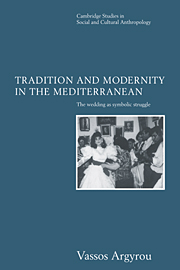Book contents
- Frontmatter
- Contents
- List of illustrations
- Acknowledgments
- Introduction
- 1 The island of Aphrodite
- 2 Nationalism and the poverty of imagination
- 3 The weddings of the 1930s
- 4 The meaning of change
- 5 Distinction and symbolic class struggle
- 6 Anthropology and the specter of “monoculture”
- 7 The dialectics of symbolic domination
- Appendix
- Notes
- References
- Index
- Cambridge Studies in Social and Cultural Anthropology
5 - Distinction and symbolic class struggle
Published online by Cambridge University Press: 25 August 2009
- Frontmatter
- Contents
- List of illustrations
- Acknowledgments
- Introduction
- 1 The island of Aphrodite
- 2 Nationalism and the poverty of imagination
- 3 The weddings of the 1930s
- 4 The meaning of change
- 5 Distinction and symbolic class struggle
- 6 Anthropology and the specter of “monoculture”
- 7 The dialectics of symbolic domination
- Appendix
- Notes
- References
- Index
- Cambridge Studies in Social and Cultural Anthropology
Summary
Definitions
Contemporary Cypriot wedding celebrations are about cultural choices, tastes, and lifestyles. They are also about class identity, social position, and power. The former cannot be reduced to the latter in any direct and immediate way, but neither is “status” as independent of social class as Weber (1946) argued. The position that I will adopt here is the middle ground between the Weberian and Marxist approaches, what is often called “practice” or “praxis” theory (Bourdieu 1977, 1990: Giddens 1979, 1984). The emphasis, then, will be on the active side of human agency for as Willis (1981:171) put it, “Determinants need to pass through the cultural milieu to reproduce themselves at all.” Thus, even though class conditions constrain practices, between the two operates the cognitive action of social agents which cannot be disregarded.
Weddings demonstrate this very well. It is not because they are poorer that the dominated classes stage “village” weddings – they cost at least as much as the weddings of the bourgeoisie. Rather, it is because these celebrations express and reproduce a particular identity – itself the product of specific conditions of existence – an identity by means of which people make sense of themselves and others. Having said that, it is important to bear in mind that human agency tends to reproduce socioeconomic determinants (and itself), even if by default, so to speak.
- Type
- Chapter
- Information
- Tradition and Modernity in the MediterraneanThe Wedding as Symbolic Struggle, pp. 111 - 152Publisher: Cambridge University PressPrint publication year: 1996



